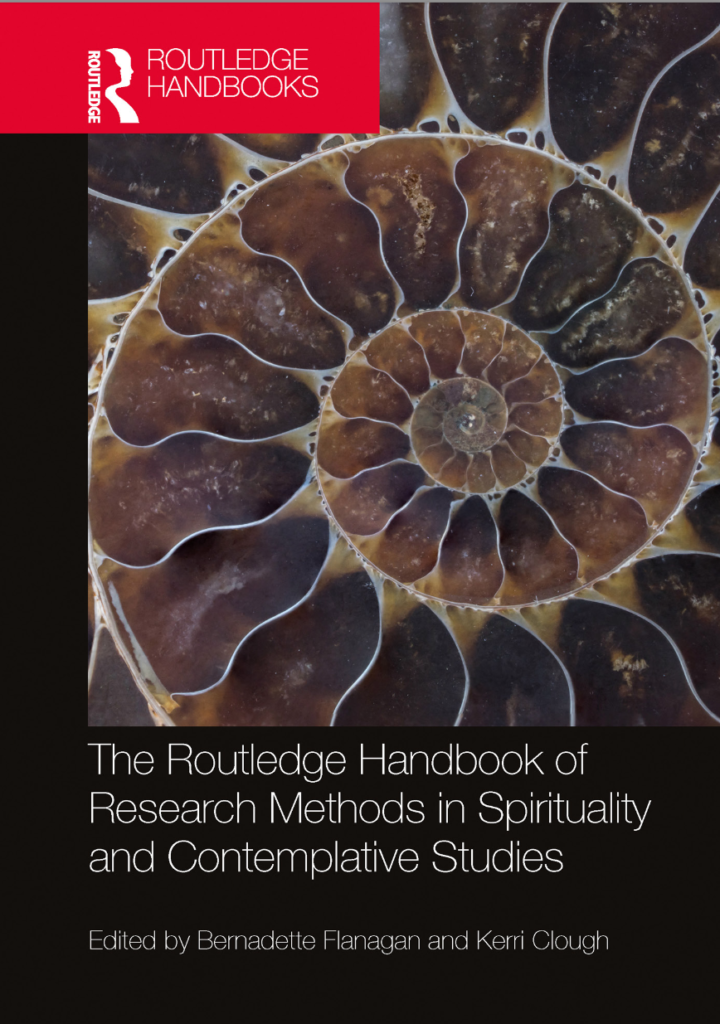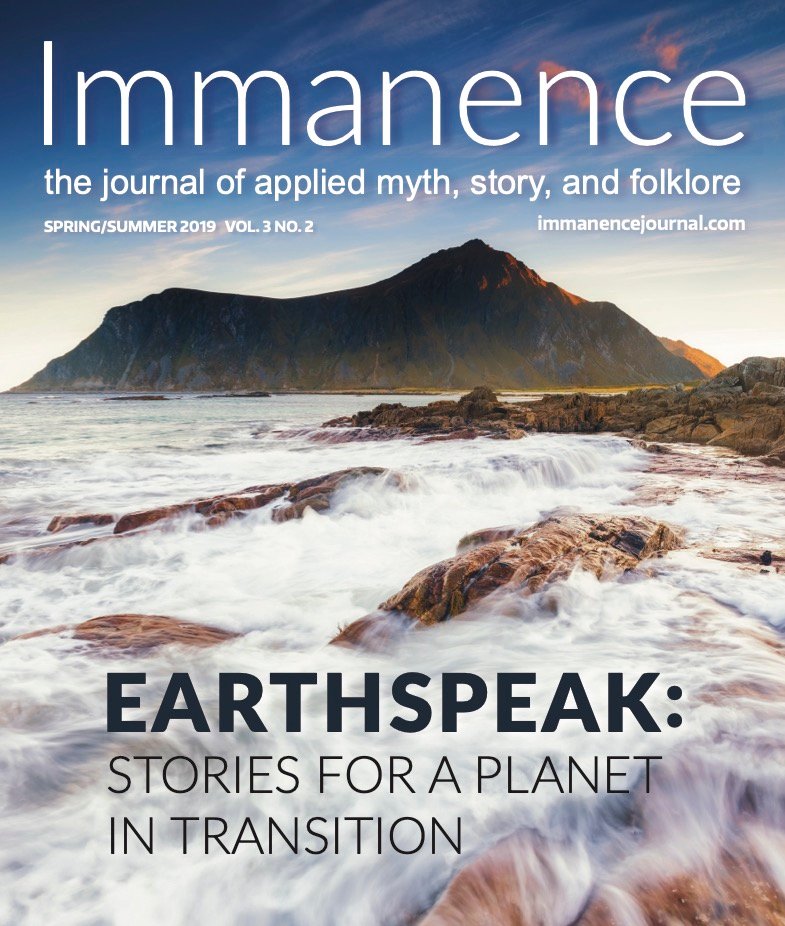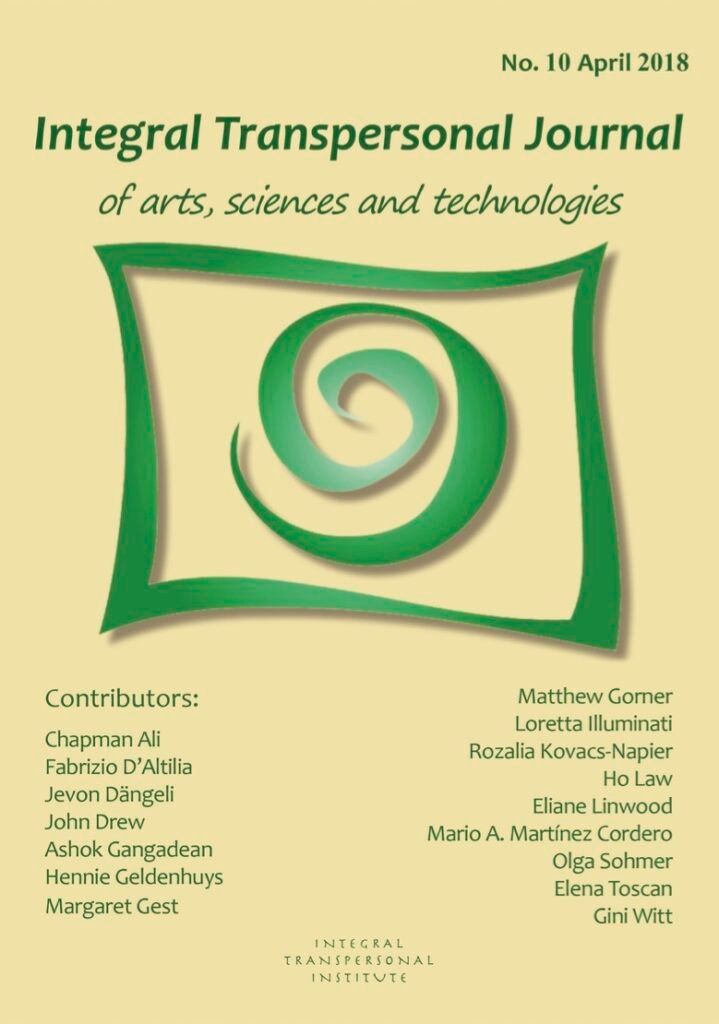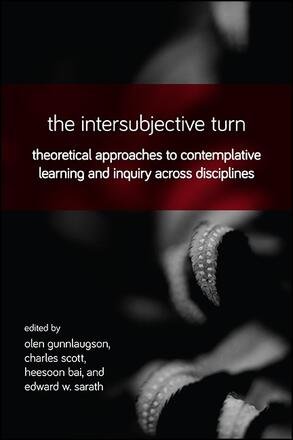Publications
Select publications in the fields of transpersonal, humanistic, and depth psychologies; participatory research and cooperative inquiry in transpersonal, spiritual, and contemplative studies; archetypal and applied mythology, and more.
- Cooperative Inquiry: An Experiential and Participatory Research Method in Spirituality and Contemplative Studies
- Embodied Spiritual Inquiry: A Participatory Research Method in Spiritual and Contemplative Studies – Olga Sohmer & Jorge Ferrer
- An Exploration of the Value of Cooperative Inquiry for Transpersonal Psychology, Education and Research: A Theoretical and Qualitative Inquiry
- Addressing Persistent Challenges in Transpersonal Psychology: Cooperative Inquiry as an Innovative Response
- The Experience of the Authentic Self: A Cooperative Inquiry
- Goddesses of Wholeness: An Exploration of Gaia, Demeter-Persephone, and Ariadne Through the Lens of Personal Myth and Archetypal Activism
- Introduction to Special Topic Section of The International Journal of Transpersonal Studies: Participatory Research Methods
- An Embodied Spiritual Inquiry into the Nature of Human Boundaries: Outcomes of a Participatory Approach to Transpersonal Education and Research – Olga Sohmer, Ross Baumann & Jorge Ferrer
- An Interview with John Heron: Exploring the Interface between Cooperative Inquiry and Transpersonal Studies
- Interactive Meditation Practice as Research Method: An Introduction to Embodied Spiritual Inquiry
- A Radical Approach to Second-Person Contemplative Education – Jorge Ferrer & Olga Sohmer

Routledge International Handbook of Research Methods in Spirituality & Contemplative Studies (2024)
Cooperative Inquiry: An Experiential and Participatory Research Method in Spirituality and Contemplative Studies
This chapter presents the Cooperative Inquiry (CI; Heron 1996) research approach in the context of spirituality and contemplative studies. CI is an experiential and participatory approach to research, learning, and psychospiritual growth (Sohmer 2020a, 2020b; Heron and Sohmer 2019). Founded by John Heron (1996) and elaborated with Peter Reason (Heron and Reason 1997, 2006), CI is a radically collaborative means to generate knowledge and facilitate transformation within small collaborative groups of mutually interested co-inquirers. Unfolding through multiple cycles of action and reflection, CI draws upon the full range of human faculties (e.g., somatic, emotional, intuitive, imaginal) and creates opportunities for experiential learning and transformation throughout the research process itself. Read More

Routledge International Handbook of Research Methods in Spirituality & Contemplative Studies (2024)
Embodied Spiritual Inquiry: A Participatory Research Method in Spiritual and Contemplative Studies – Olga Sohmer & Jorge Ferrer
The main purpose of this chapter is to introduce Embodied Spiritual Inquiry (ESI) as a novel participatory research method in the context of spiritual and contemplative studies. ESI applies Albareda and Romero’s interactive embodied meditations (Ferrer 2003) in the context of a participatory research paradigm inspired by Cooperative Inquiry (CI; Heron 1996) in order to access multiple human faculties (e.g., somatic, vital, emotional, mental, contemplative) and mindfully inquire into collaboratively decided questions. ESI systematically engages both contemplative awareness and multiple ways of knowing through mindful physical contact among practitioners. Contemplation is thus not applied as a preparation for or enhancement of intellectual learning (valuable strategies in themselves), but as the very means of a multidimensional, participatory inquiry seeking to intersubjectively access the epistemic power of all human attributes (i.e., body, vital world, heart, mind, and consciousness; Ferrer 2002; Ferrer, Romero, and Albareda 2005). Read More

Dissertation – California Institute of Integral Studies – Published Open Access – Proquest (2020)
An Exploration of the Value of Cooperative Inquiry for Transpersonal Psychology, Education and Research: A Theoretical and Qualitative Inquiry
Cooperative inquiry (CI) is an experiential, participatory approach to research and learning about human experience (Heron, 1996a). In this method, a small nonhierarchical group of co-inquirers engage multiple ways of knowing through cycles of action and reflection to explore topics of mutual interest. Using the multi-paper format, this dissertation examines CI in theory and practice to explore the value of this approach for transpersonal psychology, education, and research. After reviewing the literature regarding existing and prospective applications of CI in transpersonal psychology, education, and research the dissertation presents one theoretical paper and two qualitative studies. The first paper expands and deepens the theoretical discussion regarding the value of CI for transpersonal psychology. The second paper presents an Embodied Spiritual Inquiry—a participatory research and holistic education approach inspired by elements of CI (Ferrer, 2017; Ferrer & Sohmer, 2017)—into the nature of human boundaries within and between co-inquirers. The third paper shares the process and outcomes of a CI initiated by the author exploring the experience of the authentic self. Finally, overarching themes and suggestions for further research revealed by these entwined projects are discussed. This mixed methods design (i.e., combining theoretical and qualitative approaches) advances understanding of the gifts, challenges, and mechanisms of CI in practice, while illuminating future opportunities for CI in transpersonal psychology, education, and research. Free access to full text dissertation

Journal of transpersonal Psychology (2020)
Addressing Persistent Challenges in Transpersonal Psychology: Cooperative Inquiry as an Innovative Response
This article juxtaposes a synthesis of prominent critiques arising within contemporary transpersonal psychology with an exploration of Cooperative Inquiry (CI) (Heron, 1996)—an experiential, participatory approach to human research and learning—as one avenue to address them. Specifically, repeated calls have been made for more diversity, inclusivity, social engagement, and research from general as well as participatory, feminist, and multicultural transpersonal perspectives. These critiques are balanced with concrete examples of contemporary CIs that have addressed related concerns and suggestions for future applications. Strengths of CI, such as its intrinsically collaborative and transformative dimensions, are discussed along with its limitations in the context of transpersonal validity standards. Through a creative combination of contemporary discourse in transpersonal psychology and a review of relevant CIs in practice, this article aims to inspire innovative thinking and practical responses to some of the most enduring challenges facing the field. Read More

This article presents the process and findings of a cooperative inquiry exploring the experience of the authentic self—a prominent theoretical construct in humanistic psychology and diverse spiritual traditions. Despite theoretical prominence and emergent psychological research interest, there has been little qualitative research into the authentic self as it is experientially encountered and lived. The present study addresses this gap in the literature using an experiential and participatory research approach. Seven co-inquirers joined in nine cycles of action and reflection over the course of 6 months to inquire, “What is my (the) experience of my (the) authentic self?” In collaboration with the co-inquirers, the initiating coresearcher generated six themes using thematic analysis in response to this primary research question: (a) presence and flow, (b) somatic awareness and vitality, (c) expression of truth, (d) multidimensionality and integration, (e) values and impulses, and (f) dynamism and relationality. In addition, the transformative and practical outcomes of the inquiry are discussed. Finally, several implications of these outcomes and suggestions for future research are outlined. Read More

Immanence: The Journal of Applied Myth, Story, and Folklore (2019)
Goddesses of Wholeness: An Exploration of Gaia, Demeter-Persephone, and Ariadne Through the Lens of Personal Myth and Archetypal Activism
We find ourselves at a critical threshold, a time when grave ecological destruction abounds while many life forms are under increasing threat by human hands; hope can be a scarce resource, as grief swells and the meaning behind immanent devastation is unfathomable. Yet, when mundane meaning making fails, mythology—with its vast archetypal view—can lend symbolic insight. That is, myth tending through contemplation, active imagination (Jung), dreamwork, attention to synchronicity, or cultivating an “archetypal eye” (Hillman) may offer guidance as we strive to find adequate responses to our current crises. The world’s mythological traditions provide illuminating perspectives on our relationship with the Earth at this time. In this essay, initially compelled by an exploration of personal myth (Jung; see also Chalquist)—that is, the depth psychological premise that we can find certain mythic stories and figures that resonate deeply with our life experiences and sense of self—I turned to the goddess figures of the Greek pantheon that intimate wholeness, containing the totality of life and death. Read More

International Journal of Transpersonal Studies (2019)
Introduction to Special Topic Section of The International Journal of Transpersonal Studies: Participatory Research Methods
Abridged: Participatory research methods have yet to secure an established role in transpersonal studies despite clear alignment with transpersonal research praxis (e.g., Anderson, 2018; Anderson & Braud, 2011; Braud & Anderson, 1998) and promising potential to further the transformative mission of the field (Sohmer, 2020a, 2020b). This gap has grown increasingly evident as the years elapse since the participatory turn in transpersonal theory (e.g., Ferrer, 2002, 2008, 2017; Ferrer & Sherman, 2008; Hartelius & Ferrer, 2013). Whether one views this “turn” as a paradigm shift that marks the second era of transpersonal thought (e.g., Hartelius et al., 2017; Lahood, 2007a, 2010a, 2010b; Tarnas, 2001) or simply acknowledges the well-substantiated rise of participatory perspectives in the field (e.g., Dale, 2014; Ferrer, 2011; 2017; Ferrer & Sherman, 2008; Lahood, 2007b, 2008), the contrastingly limited attention paid to practical enactments of the participatory ethos is striking… Ultimately, this monograph aims to pave the way for future applications of participatory methods in transpersonal studies not only to support the much-needed invigoration of research in the field (Cunningham, 2007, 2015; Daniels, 2013; Hartelius et al., 2017; Kaklauskas & Randol, 2016), but in service of the transformation—personal, social, ecological, and spiritual—to which transpersonal studies aspires to contribute. Open Access Full Text

International Journal of Transpersonal Studies (2019)
An Embodied Spiritual Inquiry into the Nature of Human Boundaries: Outcomes of a Participatory Approach to Transpersonal Education and Research – Olga Sohmer, Ross Baumann & Jorge Ferrer
Embodied spiritual inquiry (ESI) is a radical approach to integral and transpersonal education and research offered as a graduate course at the California Institute of Integral Studies (CIIS). Inspired by elements of participatory research and cooperative inquiry, ESI applies interactive embodied meditations to access multiple ways of knowing (e.g., somatic, vital, emotional, mental, contemplative) and mindfully inquire into collaboratively decided questions. This article presents the learning outcomes of an inquiry into the nature of human boundaries within and between co-inquirers, providing an example of how ESI is implemented in the classroom and can be used to study transpersonal subject matter. In particular, the study found that boundaries were experienced in terms of their dynamic effects rather than as static qualities, with a relationship between dissociation and overly firm boundaries, as well as a relationship between integration/merging and more varied combinations of firm and permeable boundaries. Other notable inquiry outcomes include the identification of (a) experiential qualities of the states of dissociation, merging, and integration; (b) a recursive relationship between fear and trust in the modulation of optimal interpersonal boundaries; and (c) the phenomenon of shared emergent experience between practitioners, which suggests the existence of an intersubjective transpersonal field. Open Access Full Text

International Journal of Transpersonal Studies (2019)
An Interview with John Heron: Exploring the Interface between Cooperative Inquiry and Transpersonal Studies
In this interview, John Heron—the founder of cooperative inquiry (CI; Heron, 1996, 1998)—discusses this experiential, participatory approach to research and learning with participatory research special issue guest editor Olga Sohmer. After presenting a summary of cooperative inquiry, Heron and Sohmer discuss CI in the context of transpersonal studies, including past and prospective future applications. Questioning the emphasis on “trans” in transpersonal, Heron unfolds the three dimensions of human spirituality that CI engages and offers a vision for transpersonal studies in light of CI ideals. Additional themes that are explored include cultivating authentic relationships in CI, the role of the nonhuman natural world in CI, practices based on CI principles that can be used in daily life, applying extended epistemology and radical assessment in education, self-generating culture, and the role of CI in human evolution. Open Access Full Text

Integral Transpersonal Journal (2018)
Interactive Meditation Practice as Research Method: An Introduction to Embodied Spiritual Inquiry
This article presents Embodied Spiritual Inquiry (ESI), a participatory approach to integral education and transpersonal research that has been offered since 2003 as a graduate course at the California Institute of Integral Studies (CIIS), San Francisco, by core faculty Jorge N. Ferrer. Inspired by elements of participatory research (e.g., Reason, 1994a; Reason & Bradbury, 2008) and cooperative inquiry (Heron, 1996), ESI applies Albareda and Romero’s Interactive Embodied Meditations (Ferrer, 2003) to access multiple ways of knowing (e.g., somatic, vital, emotional, mental, spiritual) and mindfully inquire into collaboratively decided questions about the human condition. Past inquiries have included diverse psychospiritual topics including the experiential features of relational spirituality (Osterhold, Husserl, & Nicol, 2007), the nature of human boundaries within and between co-inquirers (Sohmer, Baumann, & Ferrer, 2018), felt-sensed markers discerning genuine versus unreliable spiritual knowledge, experiential understandings of the personal and collective “shadow,” and the multidimensionality of the human condition. After presenting an overview of the ESI methodology and two case studies, this article discusses the merits, limitations, and future horizons of this approach for integral education and transpersonal research. Read More

A Radical Approach to Second-Person Contemplative Education – Jorge Ferrer & Olga Sohmer
Most spiritually informed approaches to education consist of the introduction of traditional contemplative practices—such as meditation, yoga, or Tai Chi—as independent courses in the curriculum or as components of class sessions. Typically, there is a period of mindfulness meditation before class begins, ritual closure, or contemplative “labs” (see, e.g., Hill, 2006; Miller, 1994; Simmer-Brown & Grace, 2011). These strategies are often understood as a preparation for—or enriching complement to—intellectual learning. For example, although Naropa University aims at the cultivation of a holistic human development, its official statement on contemplative education indicated, “the practice of sitting meditation and other contemplative practices…prepares the mind to process information in new and unexpected ways” (as cited in Gunnlaugson, 2009a, p. 19). Furthermore, as Gunnlaugson (2009a, 2009b) showed, most contemplative educators use first-person (i.e., individual subjective) or third-person (i.e., presumably objective) approaches with insufficient attention given to second-person or intersubjective approaches. According to Gunnlaugson (2009b), these overlooked “second-person approaches to contemplative education involve exploring contemplative experience from an intersubjective position that is represented spatially as between us, in contrast to inside us…or outside us” (p. 27). Given this context, the main purpose of this chapter is to introduce Embodied Spiritual Inquiry (ESI) as a novel, second-person approach to participatory learning and contemplative education. Read More